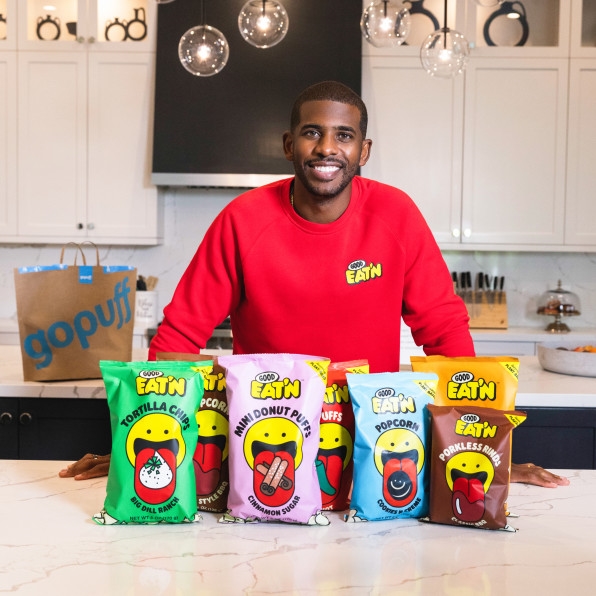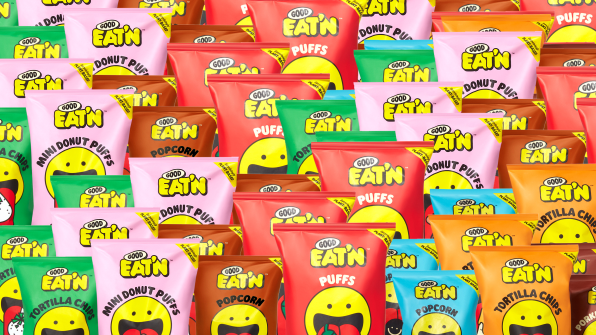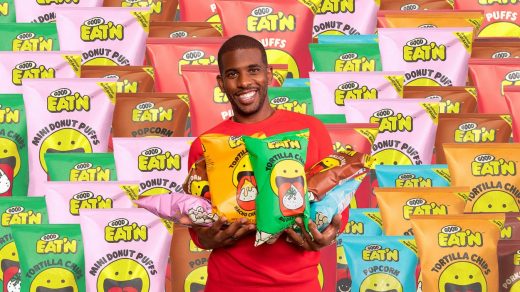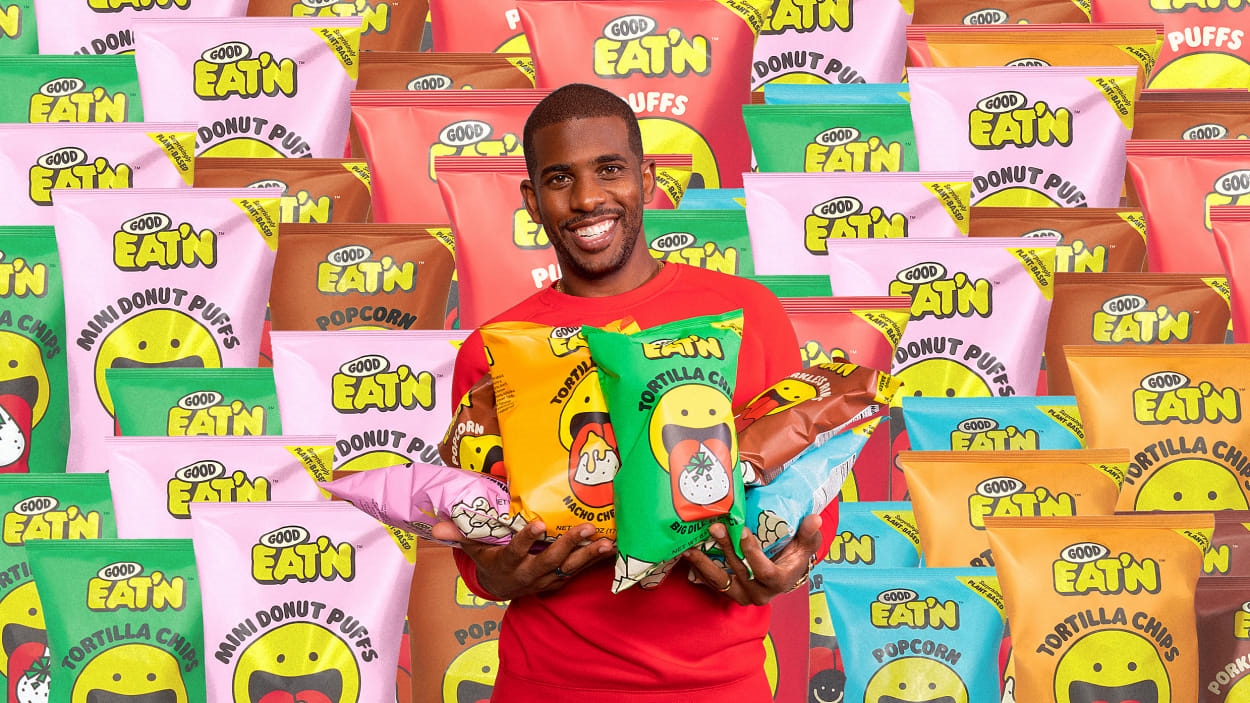Exclusive: Chris Paul launches a new vegan snack brand with GoPuff
The vegan snack aisle can be a depressing place, full of funky flavored chips that don’t quite taste like cheese, and seed-stuffed crackers that could shatter a filling. Fritos and pretzels are generally fine options, of course. But sometimes a modern human just wants to be punched in the face with the full onslaught of processed flavor. Zest. Spice. Burn.
As I opened a bag of Good Eat’n Nacho Cheese Tortilla Chips—part of a new line of plant-based snacks that 12-time NBA All-Star Chris Paul is launching today with the delivery service Gopuff—I had admittedly low expectations. But a moment later, when the aroma distinctive of fluorescent orange umami powder reached my nose, those expectations changed. And as I took my first bite, my tongue tingled from all the seasoning. My salivary glands were every bit as overwhelmed as if I were chomping on a legit Dorito, and without the slightest whiff of vegan pseudo-dairy.

[Photo: Gopuff]
“I’m born and raised in the South,” Paul tells me later, “and if you say the word ‘vegan’ to anyone in the South, they’re going to look at you like you said a curse word. Our snacks aren’t for vegans. They’re for people who eat—which is everybody.”
I have to hand it to him, his snacks are super tasty. They also represent an important evolving strategy for Gopuff, the $15 billion grocery delivery startup that’s reported to be burning through cash as it elbows for market share alongside competitors ranging from Amazon to Instacart. Gopuff doesn’t want to just be a 30-minute delivery service for essential products. It wants to make its own exclusive goods, which are so enticing you’ll use the service to get them (along with ordering a lot of groceries).
Gopuff has launched products in the past with such celebrities as actress Selena Gomez (Serendipity Ice Cream), YouTube star MrBeast (Feastables chocolate bars), and musician Cardi B (Whip Shots). But those partnerships were with brands built externally and brought onto the distribution platform. With Good Eat’n, Gopuff has built something else: A celebrity-brand mashup, formulated from scratch, available exclusively on the platform. (Paul, who invested in Gopuff in 2021, owns an equity stake in the Good Eat’n brand, too, much like how Michael Jordan owns a piece of the Jordan brand within Nike.)
Gopuff believes that, one day, Good Eat’n might spin out of its exclusive access and land on retail store shelves. But for now, Good Eat’n is built entirely to entice more people to order more items on Gopuff.
“We’re leveraging our [logistics] platform . . . to give customers what they want at an affordable price,” says Gopuff cofounder and co-CEO Yakir Gola. “That is a core priority.”

Making the brand
Paul didn’t sit in ice baths between games, formulating his own spice blends from scratch, but he’s been heavily involved in the process of building the Good Eat’n product and brand—chomping on samples with friends and family at his home in Phoenix for the past year and a half of development. Three years into vegan eating himself, which he adopted in an effort to hasten his recovery between games, Paul is credited with helping Gopuffs home in on an open corner of the market: plant-based snacks. These are not “healthy” plant-based snacks, per se, but snacks that revel in American hyperbole, with bold flavors and blinding branding.
“Food is an experience. It should be. I grew up eating any and everything,” says Paul. “In the world of being plant-based, I’ve eaten simply for nutritional value. That shouldn’t be the case.”
Gopuff gave Paul a development team that worked with food vendors to develop a line of delectable plant-based snacks that follow Paul’s own sweet (and salty) tooth, including Classic BBQ Porkless Rinds, Cookies ‘N Creme Popcorn, and Cinnamon Sugar Mini Donut Puffs. Paul cannot stand the taste of cheese, so market data and friendly taste buds helped inform savory options, like for the aforementioned Nacho Cheese Tortilla Chips, alongside Big Dill Ranch (aka Cool Ranch) Tortilla Chips, and radioactive red Hot Hot Puffs (which crunch like a Cheeto made from a gritty polenta). Gopuff already knew that spicy items consistently topped their own snack category, so taking on Flamin’ Hots was a no-brainer.
Are the snacks healthy? We’ll let the dietitians debate that. The porkless rinds are made from fava beans, for instance, and you can pronounce most of the ingredients you see. But they’re still packed with a strong one-two punch of fat, sodium, and often sugar; and you won’t find particularly redeeming numbers of protein or fiber. Gopuff and Paul, however, make no claims that they’re selling true health food, more like a snack that fulfills a niche: a “healthier” plant-based indulgence, and on a budget that puts Whole Foods to shame. The products sell for just $3.29 to $4.29 a bag—a price that Paul and Gopuff hope can bring some needed equity to the otherwise pricey plant-based lifestyle.

Bagging the business model
Targeting such a specific niche—affordable vegan snacks—may seem like a strange priority for Gopuff, but in fact, selling house brands is key to the company’s future business—which, despite having revenue growth up 60% this year, has necessitated the layoffs of 1,500 people and the closures of dozens of fulfillment centers. A bright spot of news has been Gopuff’s Basically line, launched in early 2022, which encompasses a wide assortment of basics, ranging from toilet paper to peanut-butter-filled pretzels. Today, Basically is not only a top brand across Gopuff; its bottled water is consistently one of the top-sellers (both in terms of total units and revenue) across the entire service.
For Gopuff, selling its own products makes extra sense because it already has a distribution network of roughly 700 warehouses that store its inventory. (Your Gopuff driver does not stop by 7/11 to grab candy and dishwasher detergent; and even competitors like InstaCart have started building warehouses to avoid the inefficiency of sending a person to pick up items at a retail store.) This home-built brand strategy is more or less identical to that used by Target, Walmart, and Amazon, all of which are selling more of their own products alongside private brands to maximize profits. But Gopuff’s move with Good Eat’n is particularly bold: Rather than copying existing proven products on the cheap, the company is attempting to own a relatively new category, with one of the most famous faces in sports attached. While Basically attempted to build a retail line that won on price, Good Eat’n is trying to win on taste and branding—and that’s what makes it a relatively radical move for a delivery service.
Ultimately, Paul couldn’t be more delighted about the unique hyper-specificity of this partnership, and dubs the project, “one of the coolest learning experiences and one of the funnest things I’ve ever been a part of.”
And that last bit comes all the way down to the brand identity built by Utendahl Creative, which features yellow smiley faces on each brightly colored bag. Because before we hang up, Paul grabs his phone and holds it up to the camera, to show off a wallpaper he’s used since 2019. It’s a crafts project by his daughter, featuring a big, winking yellow emoji face on a sky-blue backdrop.
“This is a painting from my daughter in 2019 when I played in Houston. [While] it had nothing to do with the creative, that’s the same color as the bag of the cookies and cream flavor,” he notes, quite convincingly, as I’d at first assumed he was actually just holding up a photo of his own popcorn bag. “I literally got goosebumps. It’s almost like it was manifested.”
(26)



